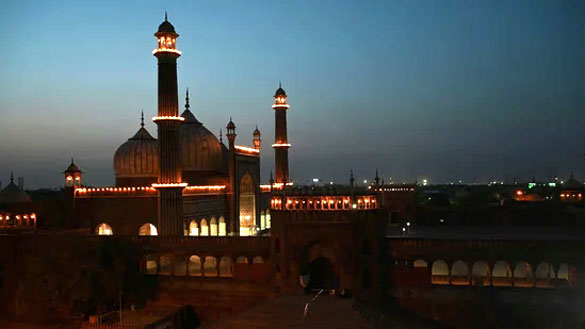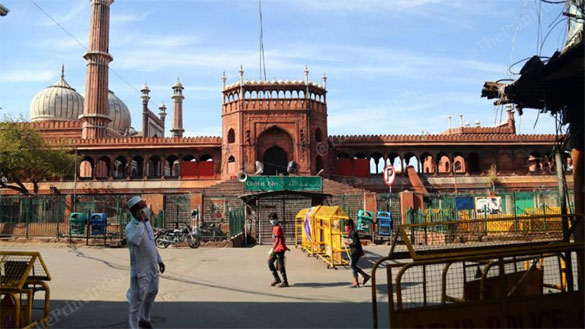Being forced to avoid large religious gatherings has worked to the advantage of Muslims. But unfortunately, Muslims are not showing any gratitude to the governments that protected them.
1. There are no long queues in Muslim graveyards for burial of Covid-19 victims.
2. Covid-19 infection among Muslims is comparatively less as they were particularly forced by a caring government to avoid large religious gatherings in mosques and Eidgahs.
New Age Islam Special Correspondent
23 May 2021

The Jama Masjid is seen illuminated during the eve of Eid-al-Fitr, which marks the end of the holy month of Ramadan, in New Delhi. (AFP)
Only the Imam and the mosque staff will offer namaz inside the Jama Masjid in Delhi. Courtesy/The Hindustan Times
------
The Central and State governments have imposed various forms of restrictions and curbs in order to contain the spread of Corona virus and to break the chain of infection. Partial and full lockdowns and night curfews have been imposed by the local administration. Religious congregations have been prohibited in mosques, Gurudwaras, churches and temples. However, at some places people violate lockdown rules and are penalised.
During the last one year, as Covid-19 spread far and wide in the country, Muslims had to bear the brunt of the restrictions more than other religious communities. While other religious communities have their religious congregations in their places of worship weekly, Muslims need to offer prayers in the mosques five times daily. On Fridays, the weekly congregation is participated by the whole adult male population of the locality. In the month of Ramadan, daily congregation of Taraweeh at night is also participated by most adult Muslims. Apart from that, Eid, Baqar Eid, Muharram and Shab-e-Barat also require Muslims to gather in mosques or Imambaras in huge numbers.
So the lockdown and night curfews wielded a huge blow on their religious routine and skipping those religious obligations was spiritually painful for them. They had to forego their religious rights in favour of collective interests of the family, society and country. Still, they obeyed the rules of the land as the Quran asks them to obey the Oolil Amr (the authority).
The ulema of Muslims also took wise and prudent decisions in view of the situation and asked Muslims to abide by lockdown rules. They cited instances from the Prophet's life to convince them that skipping congregational worship in times of epidemics or natural calamities was permissible and that Quran asks Muslims to care for their lives. Therefore, Muslims offered five times prayers, Friday prayers and even Taraweeh and Eid prayers at home.
But they also complained that while the restrictions were being applied to them more strictly and the majority community was being given some relaxations in lockdown so far as religious congregations were concerned. Kumbh Mela, Trupati Temple event or Ganga Sagar Mela are some of the religious events of the majority community in which millions of devotees participated. The media and the government reported a surge in infections after the events.

The usually crowded Jama Masjid in Delhi during the coronavirus lockdown | Representational Image | Suraj Singh Bisht | ThePrint
-----
This discrimination made Muslims feel that they were being discriminated against. But from a positive point of view, the restrictions have proved good for them. Since they did not gather in large numbers, the infections spread among them proportionately less. Though community-wise statistics of infections and deaths are not available, it can be made out from an overall scenario that Muslims have suffered less from Covid-19. Dead bodies are not seen waiting for burial in Qabristans or at least there is not kind of scramble, mismanagement and corruption that is being seen in burning ghats due to huge number of dead bodies. The dead bodies of their kith and kin are not floating in rivers.
Off course, Muslims have also faced problems in getting beds or oxygen in hospitals or in getting life-saving drugs as others have and they also have lost their dear ones to Covid-19 but they have suffered comparatively less due to their adherence to lockdown rules and total avoidance of any kind of gatherings.
Another advantage they had was of washing their hands and face five times a day (wudhu) before every prayer. This also was helpful in preventing infection.
Therefore, Muslims should be grateful to the administration for the strictness with which they made them follow the lockdown guidelines. If the administration had been lenient to them too and allowed them to gather in thousands so frequently, they would have contracted the disease in large numbers and would be facing the same problems, helplessness and pain of losing their dear ones and not being able to give them their shoulders to the graveyard and give their loved ones a decent burial.
New Age Islam, Islam Online, Islamic Website, African Muslim News, Arab World News, South Asia News, Indian Muslim News, World Muslim News, Women in Islam, Islamic Feminism, Arab Women, Women In Arab, Islamophobia in America, Muslim Women in West, Islam Women and Feminism




 Moderate Islamist here
Moderate Islamist here


0 comments:
Post a Comment